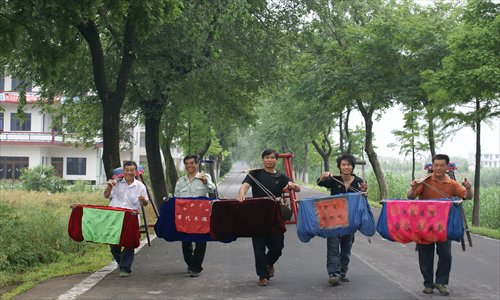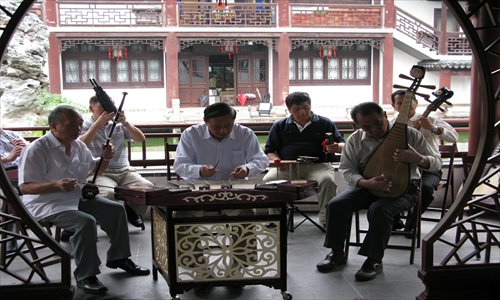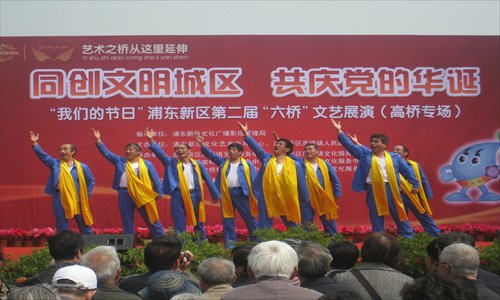来源:GLOBAL TIMES 2013 2013年3月26日
标题:Singin’ on the dock of the bay
They are probably the "heaviest" songs heard in Shanghai since the city's opening-up as a trade port in 1843.
And during the more-than-100-year active history of these songs (from the 1840s to the 1970s) whenever they were heard, it was always accompanied by the toil of labor, and the sweat of sheer physical exertion.
That is because these compositions were sung by the city's dockers and are still commonly known as haozi, or Shanghai dockers' work songs.
"These folk songs came about as a way of expressing feelings, and coordinating and directing movement in the dockers' daily labors," Shi Zhong, the deputy director of the music college at Shanghai Normal University (SNU) told the Global Times.

Performance of Chongming shoulder pole play Photo: Courtesy of Chongming Cultural Center
Cultural identity
Today, the sweat of those dock workers is nothing like as intense, and the loads on their shoulders have been eased thanks to advances in technology.
Shi told the Global Times that as a Shanghainese person he is fascinated with seeking out and preserving the cultural identity of the city and its population.
"Today in this highly internationalized city which is filled with the voices of Beethoven, Mozart, Justin Bieber and Lady Gaga, where is the room for our own local voices?" Shi said.
And what of the fate of those songs that were so tightly bound up with the manual work of these men?
Last summer Shi and a number of his postgraduate students at SNU launched a project called "Looking for Disappearing Voices."
According to Shi, this project is to research and discover the current standing of various musical cultural heritages in Shanghai.
As well as researching Shanghai dockers' work songs in Yangpu district and Tangqiao town in Pudong New Area, Shi's team have also sought out the origins of Qingpu field songs (Qingpu tian shange) in Qingpu district, Songjiang small gong and drum ensembles (xi luo gu) in Songjiang district, string instrument ensembles from the-south-of-the-Yangtze River region (Jiangnan si zhu), examples of the Yingzhou ancient pipa (Yingzhou gudiao pipa) and the Chongming shoulder pole play (biandan xi, a puppet show involving a small stage carried on the shoulders) both on Chongming Island.
Shi emphasized that their aim is not a simple recording of the origins and early history of these local traditions, details that can already be found in many relevant books.

Performance of Jiangnan si zhu Photo: Courtesy of Jiang Qianwen
Trial period
Last year, Shi himself compiled an English textbook called Shanghai Local Music Culture which is being used in international schools in Minhang district for a trial period.
"We began to make foreigners in Shanghai aware of these traditions, but this is still on a very historical level," said Shi. "But as professional music researchers, we need to discover and record the current situation of these musical traditions, and to see how they are adapting and surviving through the urbanization of the city."
All of these musical cultures have a history of at least 100 years, with some tracing their origins back to the 16th century. And since 2000, each of them has been listed as the Municipal Intangible Cultural Heritage in Shanghai, with some even achieving this rank on a national level.
What this recognition means in real terms is that local government will offer financial support to preserve and develop these traditions.
Two of Shi's students in the team, Xu Dingchen and Jiang Qianwen, told the Global Times that the dilemma for most of the traditions is that their remaining practitioners are all over 60 years old, and that it is nigh on impossible to find apprentices among the younger generation.
"Few young people want to learn about these old things," said Xu. "And some, like the Qingpu field songs, require the ability to speak the local dialect which many young people can't do anyway. Most of these elderly practitioners were born into peasant families and learnt these field songs unconsciously as they grew up on farms. They have little education, and therefore find it difficult to teach and to pass on these skills effectively," he added.

Performance of Shanghai dockers' work songs Photo: Tangqiao Cultural Center
Basic examples
Shi told us that although they did collect some written scores for examples of local music, most of these notations represent the most basic and easiest examples of songs to teach and sing. Shi said that he feels it is almost impossible to preserve these heritages in their original environments, precisely because most of those same environments have long vanished, be they the flourishing farms of Shanghai's suburbs, or the labor-intensive operations on the city's docksides.
In fact the only way of presenting these traditions today is in the form of stage performances. "And this happens either when they are performed for visiting tourists to the city, or when such performances are taken abroad for the purposes of cultural exchanges," said Shi.
Shi and his team believe that music professionals and students need to find urgent ways to ensure these fast-disappearing cultural treasures do not vanish altogether.
链接地址:http://www.globaltimes.cn/content/770795.shtml


